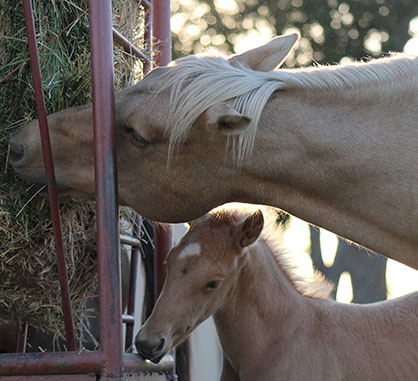Free Fecal Water Syndrome in Horses
By: Dr. Eleanor Kellon
Poor fermentation of highly fibrous hays may cause free fecal water. It’s as unappealing as it sounds. The horse has normally formed manure, but passes extra brown water along with it, staining the tail and hindquarters. This is different from diarrhea, where the frequency of passing manure is increased and/or the consistency of the manure itself is more liquid.
Diarrhea is caused by the intestinal tract secreting more fluid than normal (inflammation) and/or intestinal passage rate being increased so that there is not enough time for water to be absorbed normally. Disrupted fermentation can also cause diarrhea.
As gut contents make their way through the colon they become progressively drier and more formed. In the FFW condition, this process is not as complete as normal.
A German study reported FFW was more common in horses low in social status, leading them to propose stress as a cause. However, those horses would also be the last to eat and would get the lowest quality available food. FFW also occurs in horses under no stress whatsoever.
I believe the most likely cause is reduced fermentation activity in the large intestine. When organisms ferment food they produce volatile fatty acids – VFA. VFA are an important source of calories and easily absorbed. It has been demonstrated that absorption of VFA greatly enhances the absorption of water.
The FFW problem is typically linked to a diet change such as:
- Switch from pasture to hay
- Feeding haylage
- Hay change
- Too much grain
With hays, high fiber fractions is a common cause and switching to a lower fiber, softer hay often solves the problem. Haylage is probably an issue because the easily fermentable fractions that feed the intestinal microbiome have already been fermented. Too much grain is well documented to disrupt fiber fermentation. What constitutes “too much” will vary from horse to horse but a ceiling of 1 gram of starch per kg of body weight per meal seems to be a safe guideline. This would be equivalent to 2.75 lbs of plain oats for an 1100 lb horse.
The poor fermentation theory is supported by work done by researchers at Utrecht. They found that transfaunation was very effective. Transfaunation is when fluid filtered from intestinal contents or manure mixed with water is given to the horse by stomach tube.
As above, switching the horse to a more easily fermented hay may solve the problem. If the horse has poor chewing, try going to soaked pellets or cubes. If these measures are not enough, add a generous serving (1 to 2 cups) of wet pure psyllium husk fiber powder to meals once or twice a day. Avoid products with sugar or other ingredients.
The horse may also benefit from a high potency probiotic with good enzyme activity.
Horses with FFW are not in pain and appear healthy otherwise but do appear to have compromised intestinal function which could make them more vulnerable to something more serious. It also poses a grooming challenge and can compromise skin health. Fortunately, it’s usually correctable if you follow the steps above.
About Dr. Kellon
Dr. Eleanor Kellon, staff veterinary specialist for Uckele Health & Nutrition, is an established authority in the field of equine nutrition for over 30 years, and a founding member and leader of the Equine Cushings and Insulin Resistance (ECIR) group, whose mission is to improve the welfare of horses with metabolic disorders via integration of research and real-life clinical experience. Prevention of laminitis is the ultimate goal. www.ecirhorse.org
Uckele Health & Nutrition, maker of CocoSoya, is an innovation-driven health company committed to making people and their animals healthier. On the leading edge of nutritional science and technology for over 50 years, Uckele formulates and manufactures a full spectrum of quality nutritional supplements incorporating the latest nutritional advances. www.uckele.com.











